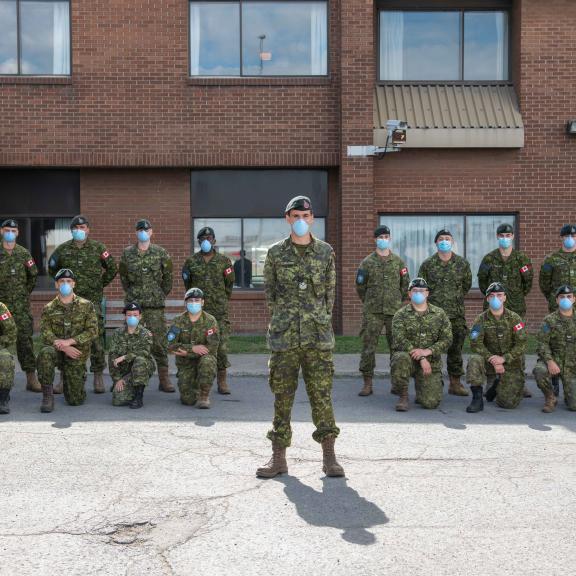

Sergeant Claude Bélanger applies his project management skills to help vulnerable seniors and workers during the COVID-19 pandemic
In mid-March, Project Manager Claude Bélanger’s work day came to an abrupt halt when his worksite - a swimming pool build in the First Nations community of Waskaganish in northern Quebec - was shut down due to the COVID-19 health emergency.
However, unlike many of his Pomerleau colleagues, Claude didn’t stay home during the lockdown. Instead, he shifted his focus entirely.
Sergeant Bélanger, reservist at the Voltigeurs de Québec since 2005, headed to Montreal as part of Operation Laser. This mission sought to bring in Forces members to relieve overwhelmed healthcare workers and provide emergency support to vulnerable elderly residents living in long-term care facilities (known by their French acronym, CHSLD).
Claude and his 28-man platoon were assigned to the VIGI Mont-Royal, one of Montreal’s hardest-hit facilities. When the Forces arrived onsite in mid-May, they found a dire situation: every one of the facility’s residents had tested positive for the virus and over 60 people had died.
Claude and his colleagues quickly completed a three-day training course and then got down to work.
My day-to-day role is to manage multiple aspects of my platoon’s work. Right now, my priority is to ensure we have enough personal protective equipment (PPE) to safely do our jobs. I also assess all needs, resources and materials, help with logistics, make sure everyone knows their orders, and assign tasks so we can be efficient. I’ve also started working on training and preparation in case of future outbreaks.
A typical work shift for Claude includes diverse tasks including scheduling, arranging meals and transportation to and from his platoon’s hotel, and ensuring morale remains high. He emphasizes his work at Pomerleau was instrumental in developing these mission-critical skills. “My job is to identify solutions and remove barriers so my men can focus on their work. This is very similar to managing complex construction projects and resolving worksite issues for Pomerleau.”
Operation Laser is unfamiliar territory for many Forces members, despite their training and skills. “We’re used to working in situations like natural disasters, floods or wildfires. We’ve never seen anything like this pandemic before, where everything changed from one day to the next,” Claude states. “We’ve had to adapt what we’re trained to do and apply it in a totally different setting.”
That said, Claude can already see positive changes. “You can sense that things are getting better. It’s very rewarding to see how even a small gesture makes the residents happy. It really doesn’t take much to make a difference and improve their lives.”
I want to thank the leaders at Pomerleau’s Quebec City office who supported my decision. I’m grateful to be able to take this time to use my Forces training and help improve the situation for CHSLD residents and staff.

